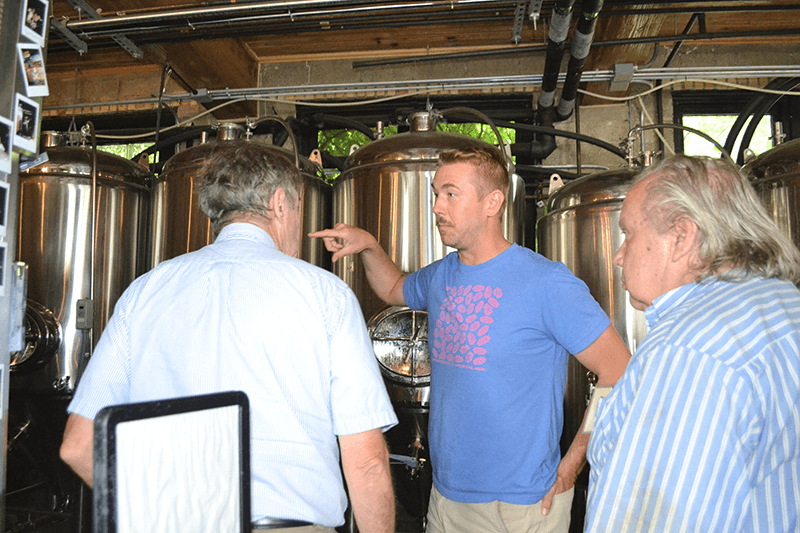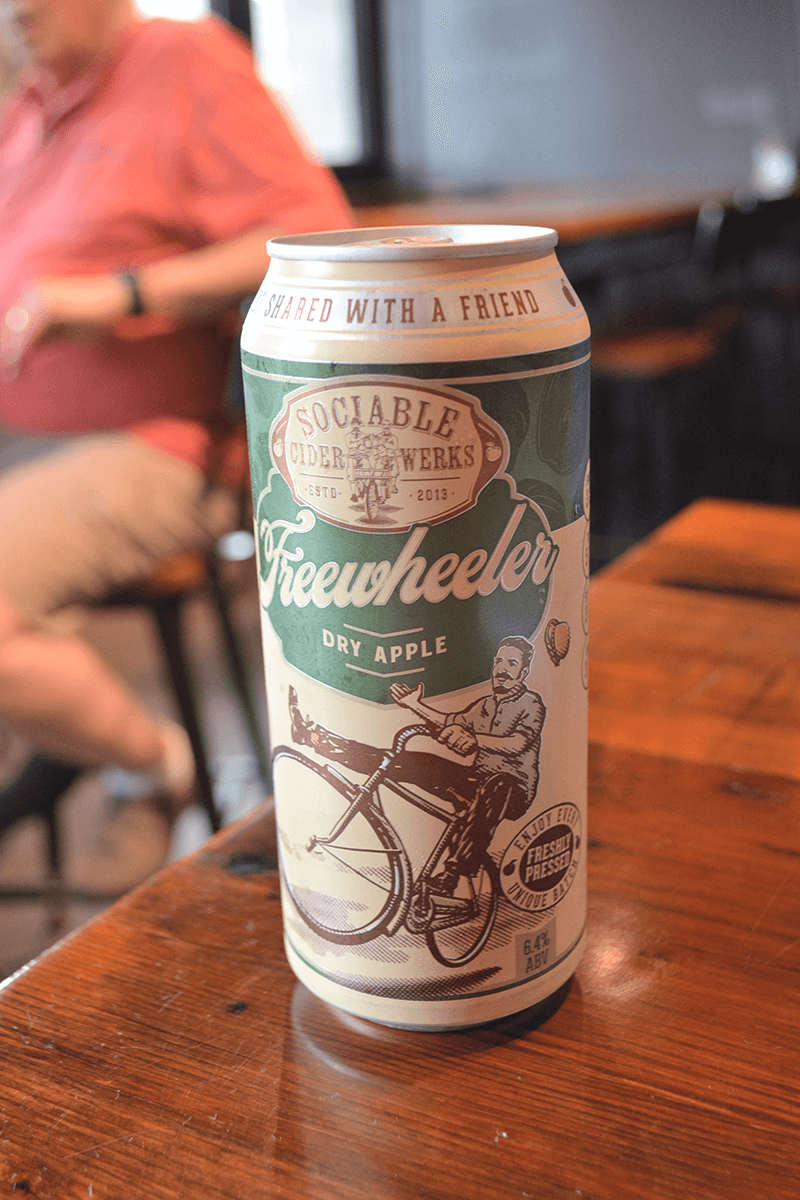You can tell when Jim Watkins has thought of another story. He glances toward the window, and his blue eyes begin to sparkle. Watkins, co-founder and managing director of Sociable Cider Werks, has a lot of stories to tell. As the cidery at 1500 Fillmore St. NE completes its tenth year of operation, you get the feeling there will be many more stories to come.
Sociable Cider Werks started because of a family Christmas tradition, Watkins told members of the East Minneapolis Exchange Club during a June 28 visit. The father-in-law of his business partner, Wade Thompson, would make 100 gallons of a northern-France-style cider that family members couldn’t get enough of. “He’d use juice pressed from Haralson apples and champagne yeast,” said Watkins. “It was light and refreshing.”
The craft beer movement was taking hold in Minneapolis. Thompson and Watkins took a hard look at what “Dad” was doing and wondered if they could build a market for cider.
Craft beer “in the DNA”
The craft beer aesthetic of experimentation and innovation is in Sociable’s DNA, Watkins said. Although the homemade cider was delicious, its reliance on one type of apple made its flavor somewhat variable. “We wanted something that was consistent in flavor and alcohol content and would pair well with food.” The pair experimented with yeast and hops and eventually settled on a version that included adding hops late in the brewing process to add aroma and flavor without the bitterness associated with beer. That dry-hopped cider was named Freewheeler and is Sociable’s signature product.
In its early years, the cidery bought its pressed apple juice from Pepin Heights Orchard south of Red Wing, Minn. When the owner closed his business, they began sourcing apples elsewhere, even as far away as California. Today, “we source based on who’s got the best apples at the time of year,” Watkins said. Many come from Michigan.
Many Sociable Cider Werks employees have come from or gone into the craft brewing industry; one former brewer even started his own brewery in California.
Taproom became a business driver
Thompson and Watkins did their homework, and found production space in an old brick factory located between Central Ave. and Fillmore St. “Northeast had all these great industrial spaces that could be repurposed for production,” Watkins said, “and that’s what we were focused on: Making our cider and getting it into the hands of distributors. A taproom was really kind of an afterthought.” They built their brewery as the landlord rehabbed the building.
It took a while to obtain a brewing license; Minneapolis wanted to know the cidery had the space to make its products before granting it. The landlord, on the other hand, wanted the license before agreeing to a lease. “We opened on Black Friday, the day after Thanksgiving,” Watkins said. “We were having Thanksgiving dinner at my house on Madison Street right down the street. The health inspectors had been in the Wednesday before, and we were just sitting around saying, ‘Why don’t we just open?’” With a couple of postings on Facebook, Sociable Cider Werks threw its doors open to the public. The day after Thanksgiving has become a traditional celebration, and the taproom is a place to introduce new products and drive retail demand.
The food trucks arrive
The immediate popularity of the taproom took Watkins and Thompson by surprise. They soon found, however, that people would leave to find food elsewhere. Not wanting to invest in restaurant equipment, but wanting to keep and attract new clientele, they hit upon the idea of having a food truck stationed outside the cidery. “In other cities, food trucks stake out a block and it’s their territory,” Watkins said. “You know where to find them. In Minneapolis, they tend to wander around.”
The partners decided to require food truck operators to sign a “residency” contract in which they would be Sociable Cider Werks’ only food partner for a year, to ensure food would be available to guests on a predictable basis. They found that each new partner brought a different sort of clientele to the taproom. Today, Sociable Cider Werks has many neighborhood “regulars.”
The first residency went to Ian Gray, who introduced the Curious Goat. He was followed by Yia Vang, who started Union Hmong Kitchen at the cidery. Since then, the residency has given birth to Red River Kitchen and Francis, which opened at 2422 Central earlier this year. Sammy’s Avenue Eatery also tried the food truck route, but Watkins said “the timing couldn’t have been worse for Sammy. COVID hit and he had to regroup to his restaurant on West Broadway.”
The current resident food truck is Paul Perez’ Unidos, which Watkins describes as “Tex-Mex meets Sheboygan sausages.”
A pandemic blessing
The coronavirus pandemic bit into Sociable’s onsite business, but increased its retail sales while customers imbibed their favorite ciders at home. It also provided an unexpected opportunity. Chicago-based R2 Cos. owned the cidery building. After the pandemic, they found themselves with a glut of Chicago office space to take care of. When the time came to negotiate the rent, Watkins and Thompson suddenly had leverage. They offered to take the building off their landlord’s hands for $2.1 million.
The acquisition not only gives them more control over their space, but the opportunity to take another look at their business. They recently upgraded their canning line, but they’re running out of production space. They’re looking at moving production elsewhere and expanding the taproom into a full-fledged event center with catering supervised by an executive chef.
In the meantime, they continue to add new products. As demand shifts, Sociable Cider Werks shifts with it. “We have started to make a more diverse product line,” said Watson. “We have become more of a beverage company.”
They make a couple of beers for beer drinkers. When hard seltzers came into play, they began making a hard seltzer iced tea. They have a line of nonalcoholic drinks called Superior. And they’re coming out with THC products. “Freewheeler still pays the bills, but we’re slowly adding products to the line,” Watkins said.
The willingness to adjust, reinvent and explore new ideas has been a hallmark of Sociable Cider Werks’ first ten years. As fall approaches, it’s a mindset and an anniversary worth celebrating.
Jim Watkins, co-founder and managing director of Sociable Cider Werks, spoke to members of the East Minneapolis Exchange Club June 28. A can of Freewheeler, a dry-hopped cider. (Photos by Cynthia Sowden) 
